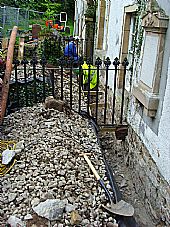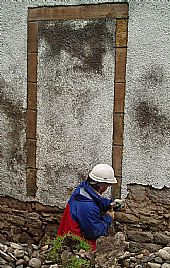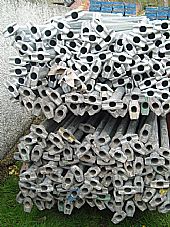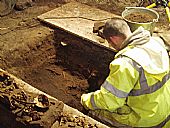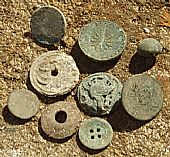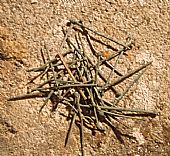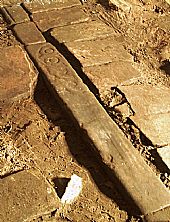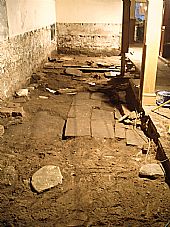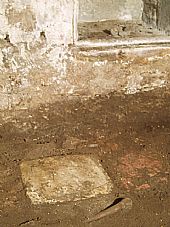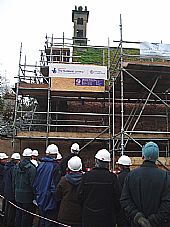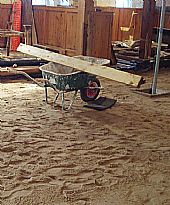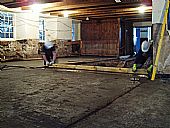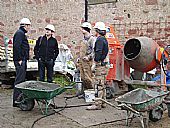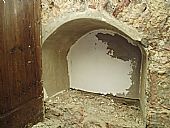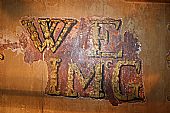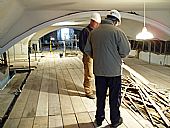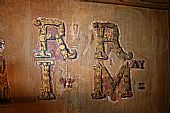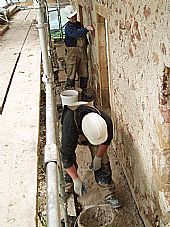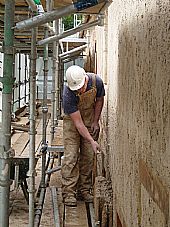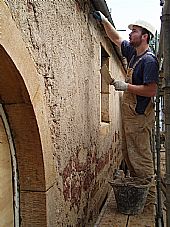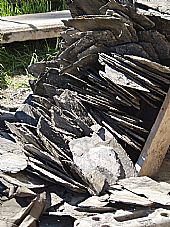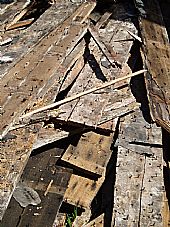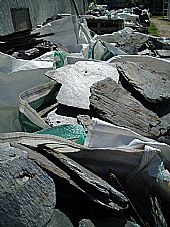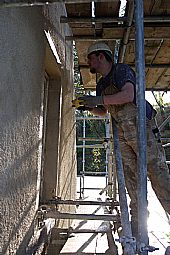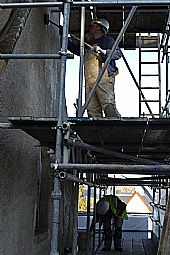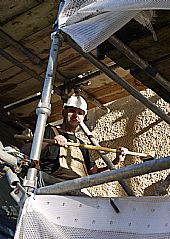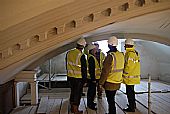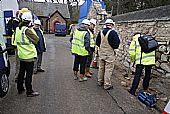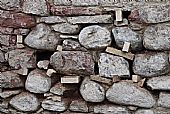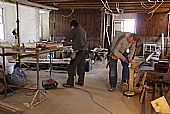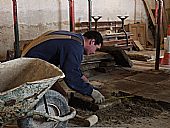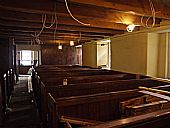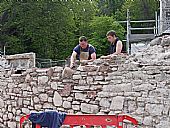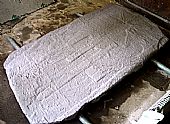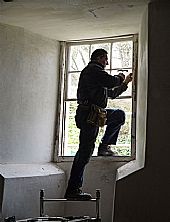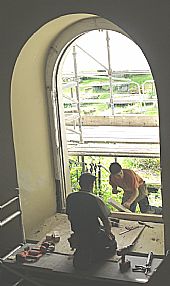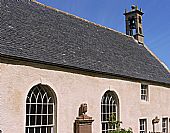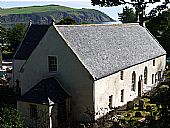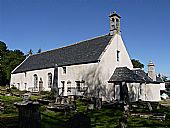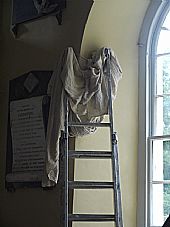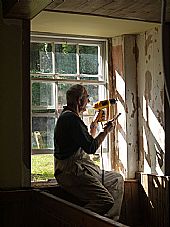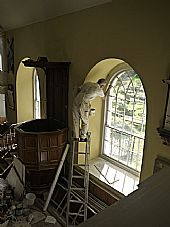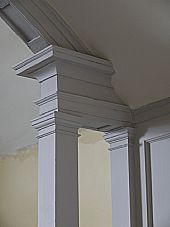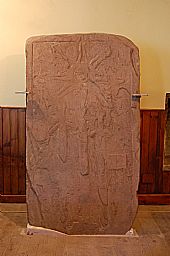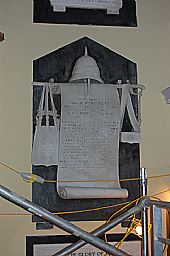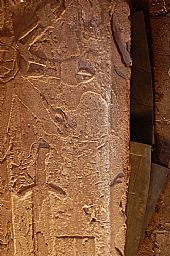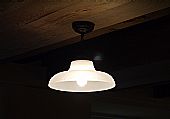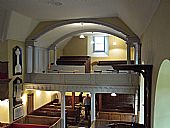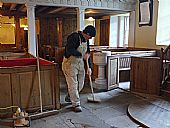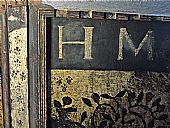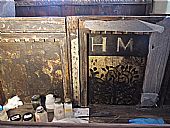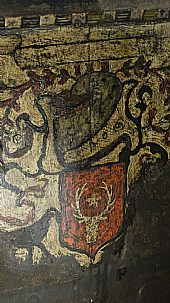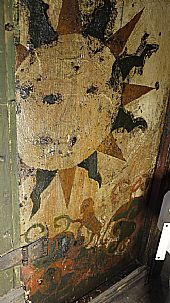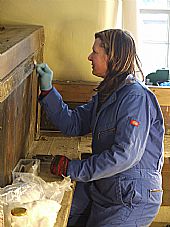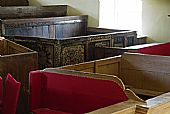The Worksite
For details of all the other conservation work carried out on the East Church take a look at the past newsletters below, or at the news section of the website.
Why bother?
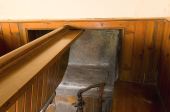 A church on this site has played an important part in Cromarty life for over 700 years; it’s medieval origin has been proven during conservation work on the church. The archaeological investigation of the inside of the church found that it was filled with burials. In addition two medieval, probably 15th Century grave-slabs have been uncovered - one of which sliced longitudinally looks to have been used as a step up to the altar. These finds would seem to confirm that the small storage space at the east end was an aumbry, which was used for storing the vessels for mass in the pre- reformation (pre 1560) Roman C
A church on this site has played an important part in Cromarty life for over 700 years; it’s medieval origin has been proven during conservation work on the church. The archaeological investigation of the inside of the church found that it was filled with burials. In addition two medieval, probably 15th Century grave-slabs have been uncovered - one of which sliced longitudinally looks to have been used as a step up to the altar. These finds would seem to confirm that the small storage space at the east end was an aumbry, which was used for storing the vessels for mass in the pre- reformation (pre 1560) Roman C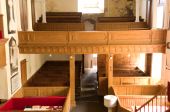 atholic church.
atholic church.
The East Church is remarkable in that many of the alterations that have taken place over the centuries are still visible today and is Grade A listed for its historic i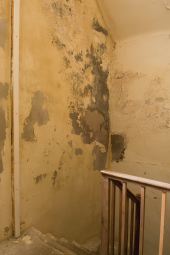 mportance.
mportance.
Damp was the cause of many of the structural problems faced by the East Church. The cement harling (render) made matters worse by trapping moisture in the church. Without tackling these problems any repairs to the church would only have lasted a short time before the building started to decay again.
A look at the news pages will reveal all the conservation work that has been undertaken to ensure that the building survives for many centuries to come.
What was the Plan?
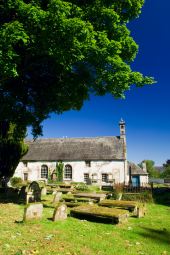 Planning the conservation work took years of research, investigation, and survey by a team of specialists assembled by the SRCT.
Planning the conservation work took years of research, investigation, and survey by a team of specialists assembled by the SRCT.
Using their expertise and the wealth of detailed information gathered during the planning process, the project team has undertaken work on the East Church following best conservation practice.
Traditional materials and techniques were used, and the project also provided an opportunity for apprentices to gain valuable skills and experience.
These are just some of the tasks were undertaken during conservation work on the church:
- The cement harling and gypsum plaster has been taken off and replaced by traditional lime harl that can both absorb water and allow moisture to evaporate - letting the building ‘breathe’. You can take a look at the Scottish Lime Centre website for more information on this process.
- Drainage ditches around the church have been redone to take more water away from the church.
- The pews were temporarily removed to allow proper investigation of the ground conditions inside the church.
- All the roof slates have been removed and any damaged timber beneath repaired or replaced. A breathable underlayer has been used and slates replaced using copper nails.
.jpg)
- The delicate astragals (fine wooden framing to each window pane) have been repaired and, only if necessary, replaced.
- Window panes have been repaired so that all the historic glass can be kept.
- The boundary wall has been re-harled and new coping stones put on.
During the conservation work apprentices worked alongside skilled craftsmen learning traditional skills of masonry and lime harling.
The East Church conservation team
LDN Architects, Forres - Architect
Laing Traditional Masonry Ltd - Main Contractor
Torrance Partnership - Quantity Surveyor
Mott MacDonald - Structural Engineer
Ridout Associates - Environmental Monitoring
Highland Archaeology Services Ltd - Archaeologist
Andrew PK Wright - Conservation Adviser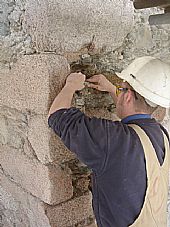
Dr David Alston - Historical research
 A church on this site has played an important part in Cromarty life for over 700 years; it’s medieval origin has been proven during conservation work on the church. The archaeological investigation of the inside of the church found that it was filled with burials. In addition two medieval, probably 15th Century grave-slabs have been uncovered - one of which sliced longitudinally looks to have been used as a step up to the altar. These finds would seem to confirm that the small storage space at the east end was an aumbry, which was used for storing the vessels for mass in the pre- reformation (pre 1560) Roman C
A church on this site has played an important part in Cromarty life for over 700 years; it’s medieval origin has been proven during conservation work on the church. The archaeological investigation of the inside of the church found that it was filled with burials. In addition two medieval, probably 15th Century grave-slabs have been uncovered - one of which sliced longitudinally looks to have been used as a step up to the altar. These finds would seem to confirm that the small storage space at the east end was an aumbry, which was used for storing the vessels for mass in the pre- reformation (pre 1560) Roman C atholic church.
atholic church. mportance.
mportance. Planning the conservation work took years of research, investigation, and survey by a team of specialists assembled by the SRCT.
Planning the conservation work took years of research, investigation, and survey by a team of specialists assembled by the SRCT. These are just some of the tasks were undertaken during conservation work on the church:
.jpg)
Laing Traditional Masonry Ltd - Main Contractor
Torrance Partnership - Quantity Surveyor
Mott MacDonald - Structural Engineer
Ridout Associates - Environmental Monitoring
Highland Archaeology Services Ltd - Archaeologist
Andrew PK Wright - Conservation Adviser

Dr David Alston - Historical research
Become a friend
Support the work of the Scottish Redundant Churches Trust in looking after historic buildings like the East Church. more »“This prestigious historic building, which is set within a beautiful conservation town, deserves sensitive repair combined with quality craftsmanship.”
Steven Laing, Managing Director of Laing Traditional Masonry Ltd


.jpg)
